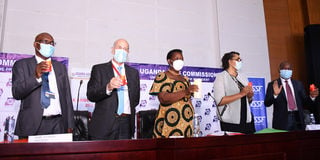Prime
55,000 women get infected with HIV/Aids weekly – UNAIDS

Left to Right: Chairperson of Uganda Aids Commission Eddie Mukoyo, EU Ambassador Attilio Pacifici, Minister for Presidency Esther Mbayo, US Ambassador Natalie Brown, and the UN Women Country Representative, Dr Maxime Houinato, during a candle light memorial celebration organised by Uganda Aids Commission in Kampala yesterday. PHOTO/RACHEL MABALA
What you need to know:
The EU activities in fighting HIV/Aids centre around sensitisation and provision of general healthcare services.
About 55,000 women and girls between 15 and 24 years get infected with HIV/Aids globally every week, officials from United Nations Programme on HIV/Aids (UNAIDS) have said.
This was revealed during a candle light memorial celebration organised by Uganda Aidss Commission in Kampala yesterday with the aim to end stigma in work places.
The latest survey of 2020 done by UNAIDS shows that more than one third (35 per cent) of women around the world get infected with HIV/Aids because they have experienced physical and sexual violence by an intimate partner or a non-partner at some point in their lives.
The survey further indicated: “In Sub-saharan Africa, five in six new infections among adolescents aged 15 and 19 years are among girls. Young women aged 15 and 24 years are twice as likely to be living with HIV/Aids as men.”
Speaking to the media, Mr Jotham Mubangizi, the acting country director for UNAIDS, said in some regions, women, who have experienced physical or sexual violence, are 1.5 times more likely to acquire HIV/Aids than women who have not experienced such violence.
The report indicated that women and girls accounted for about 48 per cent of all new HIV infections in 2019 while in sub-Saharan Africa, women and girls accounted for 59 per cent of all new infections.
However, Mr Mubangizi noted that there is a reduction in HIV/Aids related deaths by 60 per cent from 89,000 in 2000 to 22,000 in 2020 with 60 related deaths daily and 460 weekly.
“We can reduce new infections if we can maintain and ensure that young children complete the education cycle,” he said.
Ms Natalie E. Brown, the US Ambassador to Uganda, said the US President’s Emergency Plan for AIDS Relief (PEPFAR) has been and continues to be at the forefront of the battle against Aids in Uganda and globally.
“PEPFAR has invested more than Shs14.2 trillion ($4b) in Uganda alone, and more than Shs319.5 trillion ($90b) worldwide, over the past 18 years to save more than 19 million lives,” she said
This year’s theme for the event in Uganda was “Freeing workplaces of HIV/Aids-based stigma and discrimination.”
The EU head of delegation to Uganda, Mr Attilio Pacifici, said the EU and its member states contribute almost 50 per cent of all resources received by the Global Fund. He added that activities around HIV/Aids sensitisation, provision of prevention materials and general healthcare services (including HIV testing and counselling) are built into the works contracts financed by the EU.



